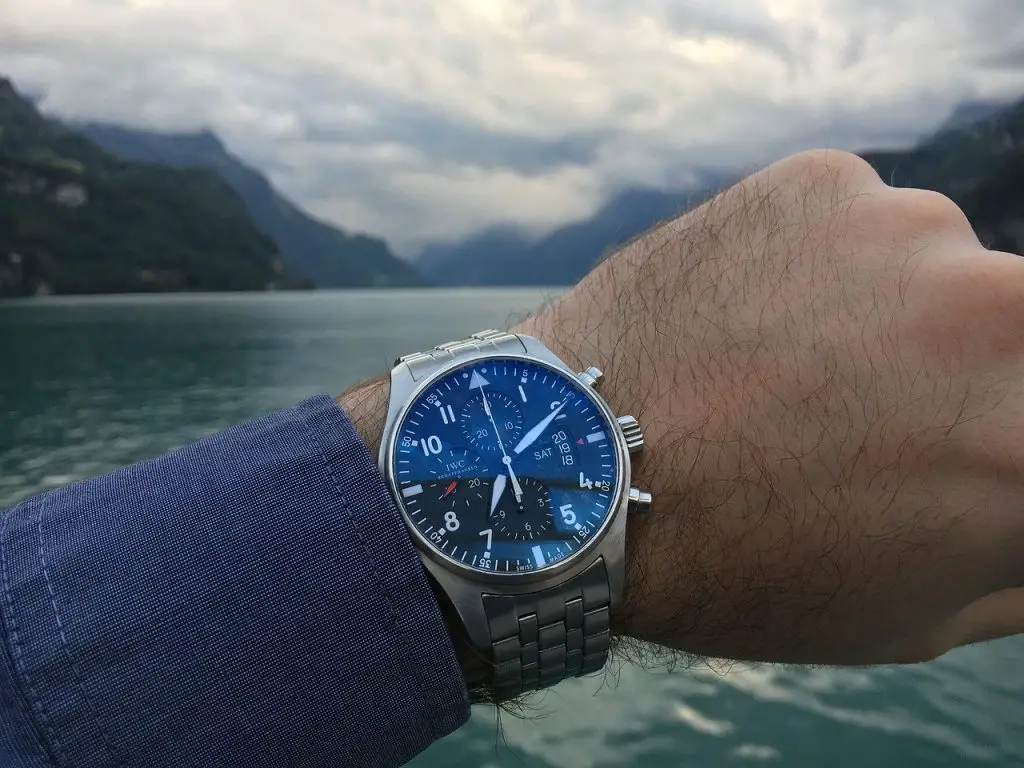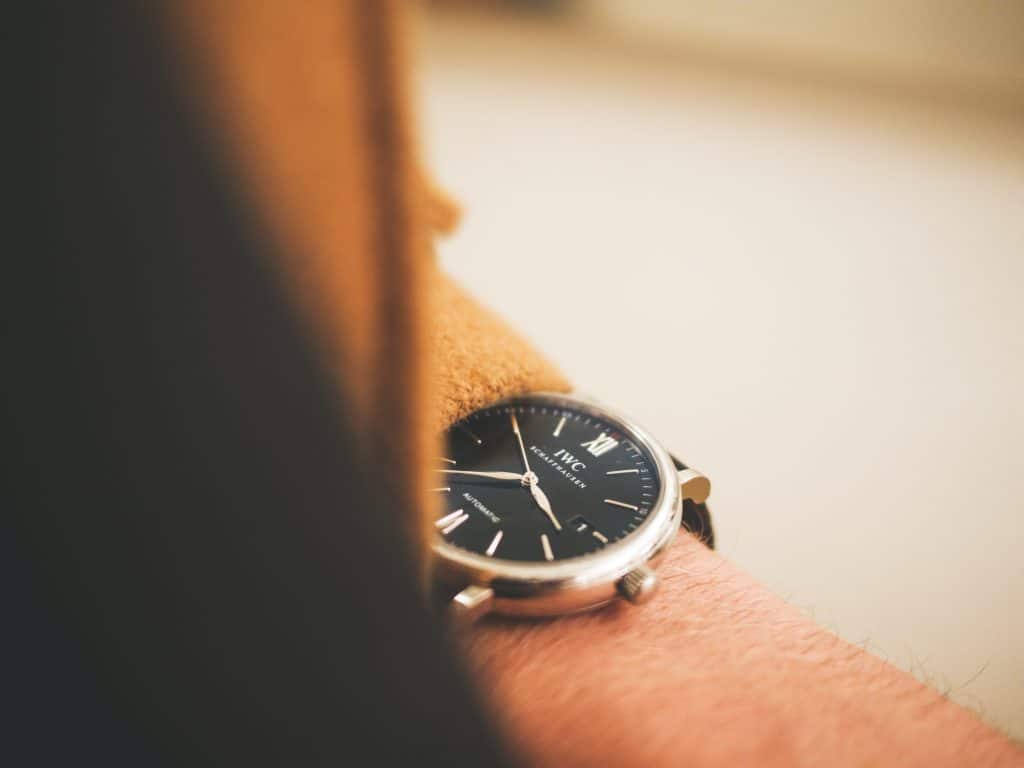The International Watch Company, better known as IWC, offers superb watches. IWC watches are typically sold for about $5000 apiece, which begs the question, why are IWC watches so expensive?
IWC is a luxury watch brand that offers high-quality timepieces, often made with precious materials such as gold and titanium. Additionally, every IWC watch is hand-assembled by a Swiss watchmaking expert. IWC watches will also last you for years to come, as they’re incredibly durable.
Even though IWC watches are expensive, there are some factors that justify the price. And the precious metals used to make the watch are just one of them. This article will take a detailed look at all the factors that contribute to an IWC’s retail price.

Table of Contents
Why Are IWC Watches So Expensive?
The retail price of a luxury watch is determined by many factors. The manufacturing process, the materials used to make the watch, and the name and brand behind the watch itself all play a role in setting the price.
Watch companies can price their products as they see fit, but the price they set needs to meet the expectations set by the customers. Below, we’ll discuss the most significant contributing factors that determine the retail price.
The Brand Name
IWC is, without a doubt, a luxury watch brand. And in order to establish yourself as a luxury brand, there are a few things you need to do. First, your products must be of fantastic quality. But secondly, there needs to be some sort of barrier to entry.
If everyone were able to purchase a luxury good, it would quickly lose its ‘luxury’ feel. Luxury items need to be special in order to retain their luxury status. And the way most brands do that is by raising the price. This restricts a large portion of people from being able to purchase such a timepiece, creating scarcity.
By doing this, the IWC name portrays an image of success, which is the exact image that luxury brands are after.
Aside from the fact that a luxury watch needs to have a luxurious feel, both material and immaterial, the high price also comes with fantastic service. You can take your IWC watch in for a service, and the watch will be returned as good as new.
Of course, you can always tell them what you want to be excluded as well. A service typically includes polishing the watch, which many watch owners do not want. But aside from your requests, the watch will be returned as good as new. Lower-end watches can be serviced as well, but luxury brands go the extra mile.
Lastly, with luxury brands in general, there’s always the aspect of ‘because we can’. Luxury brands know that there’s always a market for luxury goods, and people are willing to pay a premium for luxury products. This basically allows them to price their products to their liking, however high that may be.
The Materials Used
Aside from the immaterial value of the watch, most luxury watches are also made with luxurious and high-quality materials. These high-quality materials, often including the likes of gold and titanium, aren’t cheap, which is reflected in the watch’s price.
18-carat gold, bronze, ceramized titanium, platinum, and titanium are just some of the precious and exotic materials used in IWC watches. And as you can imagine, the incorporation of expensive materials leads to a higher retail price.

Other than the precious metals, IWC also makes use of high-quality stainless steel, high-quality leather, and a sapphire crystal. The sapphire crystal is the piece of ‘glass’ that covers the face of the watch. It’s by far the most durable and scratch-resistant watch face material out there.
The Manufacturing Process
Every single IWC watch is hand-assembled by a watchmaking expert in an official IWC workshop. Unlike mass-manufactured watches, every IWC watch is made with care and attention to detail.
By hand-assembling every watch, the company has much more control over the quality that leaves the workshops. Machines tend to let faulty watches slide, but watchmaking experts don’t.
Since every watch is made to the high standards of the watchmakers, every single IWC watch is guaranteed to be of amazing quality.
On top of that, IWC also makes its own movement. The movement is the ‘heart’ of the watch, the part that powers the watch. Manufacturing a movement in-house is extremely difficult and costly.
However, hand-assembling IWC watches isn’t something that just anyone can do. This needs to be done by watchmaking experts, and since they spend a lot of time hand-assembling them all, the manufacturing cost of an IWC watch is much higher when compared to mass-produced ones. This is once again reflected in the retail price.
The Durability And Reliability
IWC has not only established itself as a luxury watch brand, but also as a reliable one. Materials like gold don’t tarnish, and materials like titanium and stainless steel are as durable as they come. You can expect it to outlast you when you take proper care of your IWC timepiece.
Aside from the durable materials, IWC watches are also highly reliable. IWC’s portfolio includes quartz, mechanical, and automatic watches, and all perform excellently. Quartz watches, in particular, are known for their extreme accuracy, and it’s no different for IWC’s quartz watches.
IWC automatic and mechanical watches are slightly inaccurate, typically losing about 1-3 seconds a day. However, this is normal for any automatic or mechanical watch, regardless of the brand behind it. In fact, IWC is on the more accurate side here!
Do IWC Watches Hold Their Value?
IWC is one of the few watch brands that hold their value relatively well. Most models only depreciate about 10% over the course of several years, compared to the more standard 40-50% depreciation. Some models even appreciate over time, like IWC’s Big Pilot.
A common misconception about luxury watches is that they tend to hold their value well. For most brands, this simply isn’t true. Watches, and even most luxury watches, tend to depreciate between 10% and 20% per year for the first three years.

However, IWC is an exception to this rule. While they do depreciate over time, they tend to depreciate much less than other luxury watches. Expect your IWC watch to lose about 10-15% over the course of several years. This is substantially less than in most cases.
But like with most brands, there are some exceptions as well. IWC’s Big Pilot, for example, is known for holding its value exceptionally well. In most cases, they even appreciate.
The same goes for vintage watches, limited editions, and highly sought-after models. An IWC watch older than 20 years typically starts to appreciate very slowly.
Are IWC Watches Worth The Money?
IWC is a luxury watch brand known for its outstanding timepieces. IWC watches can easily last a lifetime and are made with high-quality, durable, and precious materials. They offer fantastic value for your money, but are on the more expensive side.
Whether or not a watch is worth the money ultimately comes down to you. If you don’t think a watch is worth $4000, it probably won’t matter how good the quality or craftsmanship is; it’s just not worth it to you.
However, when we’re purely looking at what the market has to offer, it’s safe to say that IWC provides fantastic value for your money. Their watches are of incredible quality and definitely come with the ‘luxury’ feel that so many are after.
Still, with an average price of about $5000 per watch, this isn’t an easy purchase. We wrote an extensive article on how much money you should spend on a watch, which you can find here, but the most important part is that you never get yourself into financial trouble because of a watch.
Always make an educated decision, especially with a large purchase like this. You could also try your luck at getting a second-hand IWC watch. Second-hand watches have already gone through the depreciation process, so you can get them slightly cheaper.
